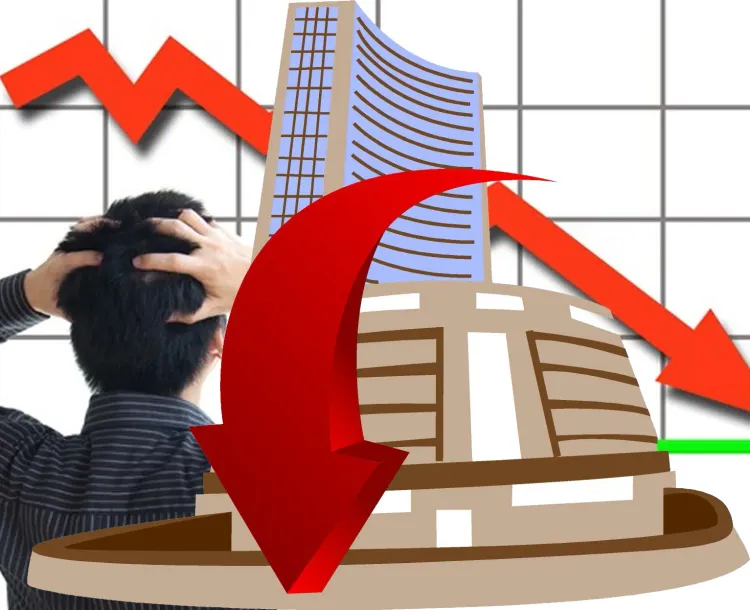Indian Stock Market Plummets 1,414 Points as Trade Tariff Concerns Mount

Synopsis
Key Takeaways
- Sensex fell by 1,414 points or 1.9%
- Nifty 50 dropped 420 points or 1.86%
- All sector indices closed in negative territory
- IndusInd Bank was the top loser, down 7%
- Market sentiment remains highly negative
Mumbai, Feb 28 (NationPress) The Indian equity market experienced a dramatic sell-off on Friday as weak global indicators and escalating trade conflicts dampened investor confidence, resulting in substantial losses for both major benchmark indices.
The Sensex plummeted by 1,414 points, equivalent to 1.9 percent, closing at 73,198 after dipping to an intraday low of 73,141.
Over the week, the index lost 2,113 points, or 2.8 percent, and saw a decline of 4,303 points, or 5.6 percent, throughout February.
Currently, the Sensex is down nearly 15 percent from its peak of 85,978.
The Nifty 50 also faced considerable setbacks, dropping 420 points, or 1.86 percent, to finish at 22,125 after reaching a low of 22,105 during the day's trading session.
It has experienced a 5.9 percent loss in February and is now nearly 16 percent below its record high of 26,277.
Rupak De, Senior Technical Analyst at LKP Securities, indicated, "In the immediate future, the Nifty is anticipated to find support in the range of 21,800-22,000. A continual rise above 21,800 could facilitate a notable recovery, while failing to maintain this level may instigate another significant drop."
The market commenced on a negative note after U.S. President Donald Trump revealed intentions to impose tariffs on Canada and Mexico starting March 4.
Moreover, Trump threatened an additional 10 percent tariff on China, exacerbating global trade worries.
The selling pressure was widespread, with all sector indices concluding in the red.
As domestic benchmark indices closed lower, IndusInd Bank was the biggest loser, crashing by 7 percent.
Companies like Tech Mahindra, Mahindra & Mahindra, Bharti Airtel, Tata Motors, Titan, Infosys, and Nestle India saw declines ranging from 4 percent to 6 percent.
Among the Sensex constituents, 27 out of 30 companies experienced losses exceeding 1 percent, with HDFC Bank being the sole gainer, rising by 2 percent.
All sectoral indices reported losses greater than 1 percent, with IT and automotive stocks leading the downturn, each falling around 4 percent.
Other sectors, such as FMCG, healthcare, capital goods, consumer durables, and oil & gas, also suffered losses exceeding 2 percent.
The broader market was similarly affected, with both the BSE MidCap and SmallCap indices declining by over 2 percent each.
The SmallCap index recorded its most significant monthly decline in five years. Market sentiment remained extremely pessimistic, with nearly five stocks declining for every single advance on the BSE.
Out of 4,081 stocks traded, 3,248 concluded in the red, while only 742 saw gains. Approximately 476 stocks hit their lower circuit limits, while 106 reached their upper limits.
Market analysts suggest that global uncertainties, in conjunction with widespread selling pressure across sectors, played a pivotal role in the sharp downturn.










